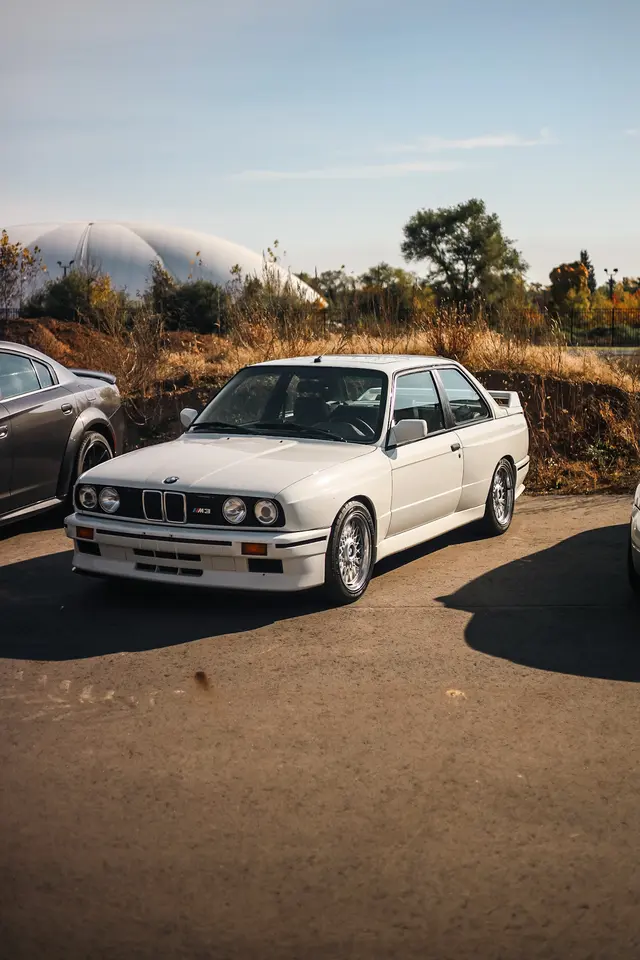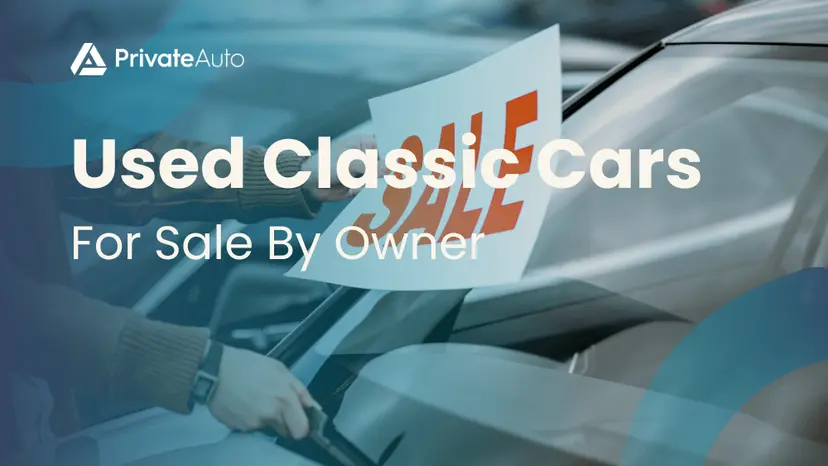
1989 Ford Bronco
Eddie bauer
•
38,000 miles
Houston, TX
$9,200

1990 Ford Mustang
GT
•
120,000 miles
Owensboro, KY
$9,900

1989 Ford F-250
XLT Lariat
•
132,564 miles
Banning, CA
$4,000

1990 Chevrolet Corvette
Base
•
77,500 miles
Wyoming, MI
$10,500

1981 Chevrolet Corvette
2D Coupe
•
105,000 miles
Oak Ridge North, TX
$14,000

1984 Chevrolet Corvette
2D Coupe
•
135,000 miles
Great Meadows, NJ
$3,900

1988 Chevrolet Corvette
2D Coupe
•
42,000 miles
Independence, MO
$11,500

1984 Chevrolet Corvette
2D Coupe
•
98,925 miles
Manor, TX
$6,500

1990 Chevrolet Corvette
Base
•
120,000 miles
Brandon, MS
$6,000

1988 BMW M3
2D Sedan
•
148,000 miles
Bloomfield Twp, MI
$85,000

1969 Volkswagen Beetle 2D Sedan
•
51,334 miles
Sterling, VA
$15,000

1987 Mercedes-Benz 560 Series
SL
•
125,500 miles
Etiwanda, CA
$18,888

1988 Jeep Comanche Pickup
Pioneer 4x4
•
102,000 miles
New Orleans, LA
$9,000

1981 Mercedes-Benz 380 Series
SL
•
135,220 miles
Palos Park, IL
$7,500

1973 Volkswagen 1600 Square/Fastback
Fastback
•
42,126 miles
Norman, OK
$3,000

1982 Fiat 2000 Convertible
Spider Pinin
•
103,294 miles
Weatogue, CT
$9,000

1985 Pontiac Fiero
SE
•
73,062 miles
El Paso, TX
$12,900

1986 Chevrolet El Camino
Conquista
•
90,000 miles
Byron, MN
$16,900

1988 Pontiac Firebird
Trans Am
•
170,000 miles
Richmond, VA
$6,500

1986 Porsche 944
2D Coupe Tur
•
78,500 miles
College Grove, TN
$20,000

1988 Mercedes-Benz 560 Series
SL
•
47,000 miles
Libertyville, IL
$42,500

1984 Chevrolet Blazer
Custom Delux
•
62,700 miles
Prescott Valley, AZ
$9,999

1989 Ford F-150
Custom
•
250,000 miles
Timnath, CO
$5,000

1983 Nissan 280ZX
2D Coupe
•
145,740 miles
Austin, TX
$17,250

1982 Jeep CJ-7
Base
•
88,150 miles
Leland, NC
$9,000

1957 Oldsmobile 88 4D Hardtop
Super
•
88 66,129 miles
Homestead, FL
$32,000

1983 Dodge Ram 150
Custom
•
89,000 miles
Merion Station, PA
$6,900

1931 Ford Model A Cabriolet
•
23,245 miles
Kaysville, UT
$14,000

1989 Cadillac Brougham
4D Sedan RWD
•
60,000 miles
Zellwood, FL
$15,000

1990 Chrysler TC by Maserati TC
•
100,271 miles
Neenah, WI
$3,500

1976 Mercedes Benz 300D
•
82,275 miles
Las Vegas, NV
$16,500

1980 Mercedes Benz 300SD
•
116,730 miles
Las Vegas, NV
$11,500

1985 Mercedes-Benz 380 Series
SL
•
162,100 miles
Milledgeville, GA
$15,450

1990 Ford Mustang
GT
•
77,268 miles
Los Angeles, CA
$15,000

1987 Porsche 944
Turbo
•
190,000 miles
Driftwood, TX
$15,900

1988 Mercedes-Benz 560 Series
2D Sedan
•
101,000 miles
Bloomfield Village, MI
$24,000

1985 Chevrolet C/K20
Black /Crome
•
5,844 miles
Saddlebrooke, AZ
$25,500

1988 Mercedes-Benz 560 Series
SL
•
105,255 miles
Belleview, FL
$14,500

1988 VOLKSWAGEN Vanagon
GL Camper We
•
115,014 miles
Carlsbad, CA
$35,000

1971 Toyota Land Cruiser FJ40
•
75,400 miles
Draper, UT
$15,000

1972 Chevrolet Camaro SS Coupe 350
Split Bumper
•
73,137 miles
GREAT SAND DUNES NATIONAL MO, CO
$30,000

Types of Classic Cars
1. Antique cars: typically manufactured before 1918 such as the 1908 Ford Model T and 1913 Duesenberg Model J.
2. Vintage vehicles: produced between 1919 and 1930 like the 1925 Rolls-Royce Phantom.
3. Classic cars: older than 25 years as the famous Chevrolet Corvette, 1989 Mercedes-Benz, and the Ford Mustang Cobra Jet.
4. Classic sports and muscle cars: known for their performance and design. Examples: 1971 Plymouth Hemi ‘Cuda, 1970 Dodge Challenger, 1969 Chevrolet Camaro, or Porchse 911.

Advantages of Classic Vehicles
1. Value
2. Uniqueness
3. Nostalgia
4. Simple mechanics
5. Low insurance costs
Appreciation in Value
Uniqueness
Nostalgia
Simpler Mechanics
- Engines often utilize basic carburetion rather than computerized fuel injection controls. This makes tuning and modifications more straightforward.
- Transmissions have fewer forward gears (3-4 speeds) and lack complex electronic controls. Shifting feels more hands-on and intuitive.
- Ignition points, condensers, and distributors are basic compared to modern computerized ignition control modules. They’re easy to adjust and service.
- Electrical systems don’t have the intricate network of sensors and modules found in new cars. Troubleshooting issues is more straightforward.
- No onboard engine management computers to diagnose. Mechanical issues can be identified through hands-on inspection and testing.
- Interchangeable parts between same-era models abound. Finding compatible replacement components is easier.
Lower Insurance Costs
There are a few key reasons for this:
- Classics are typically not used for daily commutes, so fewer miles driven annually lowers risk. This is why most insurance companies offer discounted ” pleasure use” plans.
- Owners tend to be older and more experienced drivers with good records, representing lower risk. Safe storage also reduces theft and damage risk.
- Limited usage means lower premiums for collision and comprehensive. Most owners select just liability coverage.
- No need for expensive collision avoidance tech and replacement parts coverage.
Disadvantages of Classic Vehicles
1. Unreliability: classic cars can be less reliable than modern vehicles due to their age and older technology. Regular maintenance and tune-ups are essential to keep them running well.
2. Fuel efficiency: classic cars generally have lower fuel efficiency compared to modern vehicles.
3. Expensive parts: sourcing parts for classic cars can be expensive, as they may need to be custom-fabricated or imported from other countries.
4. Rust and corrosion: classic cars, especially those made before the 1980s, are more prone to rust and corrosion due to the materials used in their construction.
5. Lack of safety features: classic cars do not have the same safety features as modern vehicles, such as airbags, anti-lock brakes, and crumple zones, which can make them less safe in crashes.
6. Comfort and convenience: classic cars lack modern comforts and conveniences, such as air conditioning, power windows, and infotainment systems.
7. Insurance limitations: some insurance policies for classic cars may not cover the actual value of the car or allow daily driving.
What’s the Most Desirable Classic Car?
1. Ferrari 250 GTO
2. Lamborghini Miura
3. Ford Mustang Boss 429
4. Aston Martin DB5
5. Mercedes 300SL Gullwing
6. Jaguar E-Type Series I
7. 1967 Chevrolet Impala
How to Research Classic Car Pricing?
First up, get super detailed on exactly what make, model, and year you’re dealing with. A 1969 Mustang is different than a 1970, and a base model Coupe varies big time from a Boss 302.
Then dig into recent sales listings on all auction websites—this gives you the ballpark range.
Better yet, auction your car yourself with our self-serve, low-cost auction technology—and find out what the market is willing to pay.
Where is the Best Place to Buy a Classic Car?
1. Buy a classic from a classic car dealer.
2. Buy a classic vehicle from a private seller.
3. Buy from an auction website such as Cars and Bids or Hemmings.
4. Buy on PrivateAuto with our easy self-serve technology
When you’re investing in a classic car, you’re better off buying from a private seller. Buy on PrivateAuto with our easy self-serve technology, skip the fees, and get more classic for your buck when you transact on PrivateAuto.
From instant payments to secure communications, we give you the power to drive the deal on your terms. That’s why we’re the best place to buy a used classic car online. We have a wide selection of non-classic perfect vehicles for sale as well.
Browse our full selection of vehicles for sale by owner.

Where is the Best Place to Sell My Classic Car?
Classic car dealers have to buy low so they can mark your car up and make a profit. When you sell directly to the end user, you capture that extra profit.
PrivateAuto gives you dealer-like convenience in the palm of your hand, so you can sell your classic on your terms.
- Never give out your contact info
- Steer clear of car scams with identity verification
- Act as your own escrow service with our escrow-like safeguards
- Get paid instantly, up to $1M, with no transfer fees
Even better, you can list your car on other marketplaces. If you find a buyer, you can use our DealNow feature to invite the buyer to a fast-tracked dealflow that gives you all the advantages of our transactional infrastructure.
Create your listing on PrivateAuto now and see how easy selling your classic can be.
Classic Vehicle FAQ
Are classic cars good for daily driving?
Classic cars can be suitable for daily driving, but it depends on the specific car and its condition. Some classic cars, such as the Volkswagen Beetle and Ford Mustang, are known for their durability and can be driven daily with proper care.
Do classic cars use more fuel?
Classic cars can use more fuel than modern vehicles due to their older technology and less advanced engine designs. Some classic cars are more fuel-efficient than others like the Citroën 2CV, Fiat Nuova 500, and Austin-Healey Sprite.
What is the best classic car to invest in?
The Ferrari 250 GTO is considered one of the best classics for investment, with multi-million dollar auction sales and continual price appreciation. But the Mercedes-Benz 190 and Toyota MR2 Mk1 are a good investments as well.Buying an older used Jeep can certainly be worth it, but it comes down to finding one that is in great condition. If you’re able to locate a well-maintained Jeep model from the 1990s or early 2000s, it can be an excellent purchase.
These older Jeeps often have the iconic styling and rugged off-road capabilities that enthusiasts love, but at a lower upfront cost compared to newer versions. The key is to thoroughly inspect the vehicle, review its maintenance history, and ensure it has been cared for properly over the years.
With the right older Jeep in great shape, you can enjoy the benefits of lower prices, proven reliability, modding potential, and classic design – making it a worthwhile investment for the right buyer.
What is the rarest classic car?
The 1967 Ferrari 275 GTB/4*S NART Spider is one of the rarest, with only 10 examples produced. It has sold for over $25 million at auction.While it offers a unique, rugged driving experience with some modern amenities, the Wrangler’s off-road-focused design does result in some compromises in terms of spaciousness, noise levels, and ride quality compared to more mainstream SUVs.
What is the best classic muscle car?
Leading muscle car include the 1969 Boss 429 Mustang, 1970 Hemi ‘Cuda, 1969 ZL1 Camaro, and 1971 Plymouth Hemi ‘Cuda convertible.The Jeep death wobble is an unnerving suspension defect or forced loss of control that can occur in some Jeep vehicles, particularly the Jeep Wrangler. It manifests as an uncontrollable, violent shaking of the vehicle’s front end, primarily felt through the steering wheel.
The death wobble is typically triggered when one of the front tires hits a bump, pothole, or other road imperfection at speeds around 45-55 mph. This causes the front suspension and steering components to start vibrating and shaking uncontrollably, making the vehicle extremely difficult to control.
If you experience the Jeep death wobble, get your vehicle inspected by a qualified mechanic so that worn parts can be replaced.
Which classic cars retain their value best?
Ferraris, Mercedes Gullwings, Hemi Cudas, Cobras, and other rare performance cars hold value well if maintained. Mainstream classics depreciate more.
What makes a car a classic?
What makes a classic car classic its age (typically 20+ years), design significance, unique engineering, limited production, and collectibility contribute to classic status.
What is a cheap classic car?
Affordable classics can be vehicles like the Mustang, Camaro, Charger, Corvette, BMW 2002, MG, Triumph, and older classic trucks.
Do classic cars have an automatic transmission?
Classic cars can have either automatic or manual transmissions. Automatic transmissions provide ease of use and smooth shifting, while manual transmissions offer a more engaging driving experience.
Do classic cars have the same engine blocks as modern cars?
Classic cars don’t usually have the same block engine as modern cars. Classic cars can be equipped with a variety of engine blocks, including inline, V-shaped, and flat engines, depending on the make and model of the vehicle.
What fuel type do most classic cars use?
Most classic cars were designed to run on leaded fuels with a high octane rating.
Do most classic cars have a 5-speed manual transmission?
Classic cars do not typically have a 5-speed manual transmission as a standard feature. Many classic cars were equipped with 3 or 4-speed manual transmissions, while some high-performance or sports cars from the mid-20th century may have a 5-speed manual transmission.
How rare is the 1962 Ford M-Code Thunderbird hardtop?
The 1962 Ford Thunderbird M-Code Hardtop is considered rare, as it was equipped with the M-Code 390 V8 engine, which was a high-performance option.